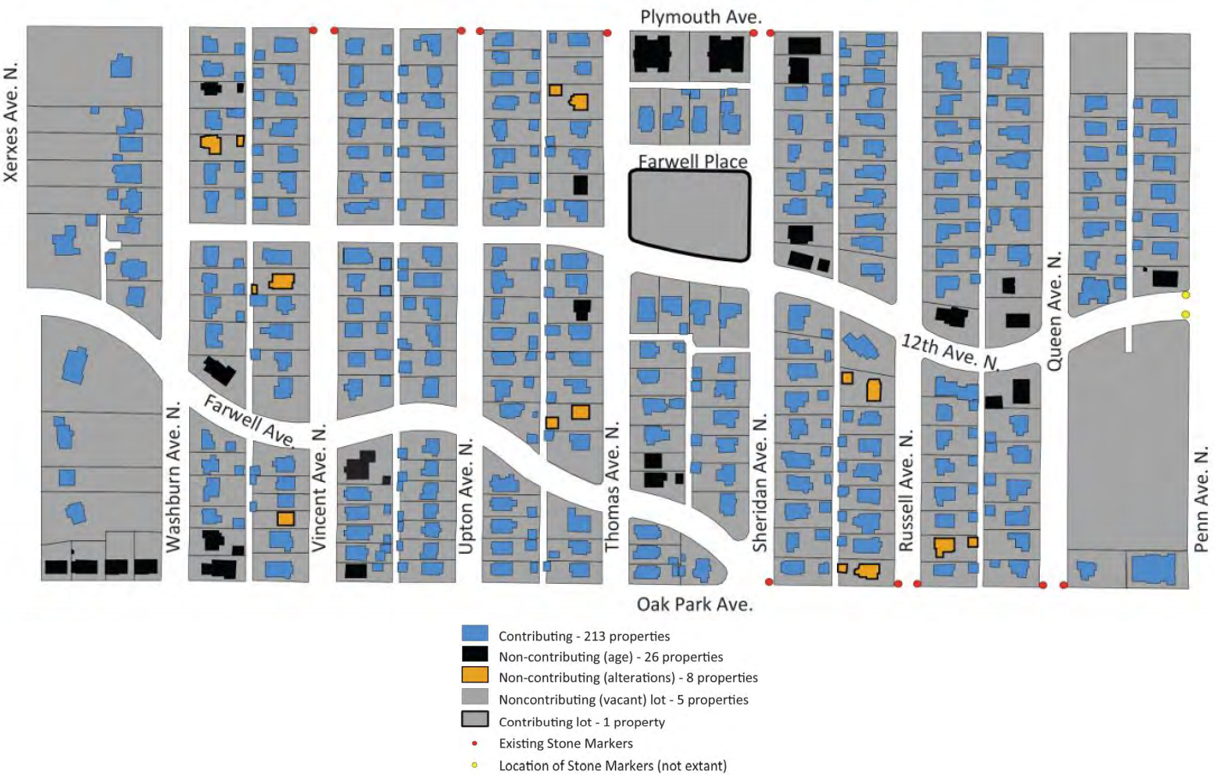Council will wait to vote on Homewood historic designation
The Homewood neighborhood is filled with architecturally significant homes and a rich history of people. Photo by Kenzie O'Keefe
By Kenzie O'Keefe | Editor
For over a year debate has roiled over whether Homewood neighborhood in North Minneapolis should be given official historic designation from the City.
This map of Homewood neighborhood shows which properties have been considered for historical designation.
Residents have been deeply divided – some believe designation is the only way to protect the area’s historically significant architecture from incoming developing forces. Others believe it will contribute to gentrification – driving up costs of living in the neighborhood in ways that will push out the very residents that make the place historic.
In March, the Minneapolis Heritage Preservation Commission (MHPC) voted to recommend that the Minneapolis city council designate the district. At that time, Ward 5 (which includes Homewood) councilmember Blong Yang requested and received up to an additional six months for the council to review a nearly 1000-page city staff study on the topic and explore potential financial incentives for homeowners before voting on it.
But the council did not vote on designation at their October 6 meeting, which marked the end of that six-month time period. On September 28, the Zoning and Planning Committee voted to refer the item back to staff (a motion made by chair of the committee Lisa Bender) and direct it to work on community engagement (a motion made by council president Barb Johnson).
Yang, who is not on the committee, spoke at the meeting to support this outcome. He described the process as “probably the most contentious issue in Ward 5 to come before the council while I’ve been a member.” He lamented the discord the process has created thus far, and said he supported referring the item back to staff “so they can work to find a much more delicate solution to this – one that respects neighbor’s property rights, one that elaborates on the entire history of Homewood, and one that allows for opportunity and growth while still preserving the central character of Homewood.”
Bender supported Yang’s request but expressed her concern for the way the city approaches historic districting, particularly in places that are “of cultural significance,” she said. When part of her ward was given historic designation earlier in her term, she said she door-knocked every door twice and invested significant time answering the many questions and concerns from property owners in the area. “I think it’s the right thing to do at this time to regroup. I do think it’s too bad that so long has gone by without that happening,” she said.
Yang responded saying that he “loves the idea of doing outreach” but that the “quasi-judicial process” of designation makes it difficult. “It’s hard to be knocking on people’s doors because people are going to ask what position you’re on and you can’t really say anything about that. That just makes it hard. If that wasn’t the handcuffs to my hands, I think I could easily door knock 254 houses in a weekend or two,” he said.
Initially Yang asked for interim protection, which has been in place for six months, to be extended for six more months. At the September 28 meeting, the assistant city attorney said the city did not have a legal route to make that move. Despite the expiration of interim protection (which required property owners in the area to adhere to federal historical designation guidelines when augmenting the exteriors of their homes), anyone who wishes to demolish a property in the city is required to submit it for the city zoning administer to review as a potential historic resource, causing city officials to feel that adequate protections are in place in Homewood without the interim guidelines. “We don’t feel that we’d be putting any properties at risk,” said Steve Poor, director of Development Services for CPED, who spoke to the committee members on September 28.
Martine Smaller, Executive Director of the Northside Resident’s Redevelopment Council (NRRC), the neighborhood organization for the area, says she appreciated residents on both sides of the issue being engaged in the designation process. “Additional outcomes that I would like to see is the same level of interest and study in the residents of Homewood that stabilized and maintained this community from the 1970's on,” she said.


